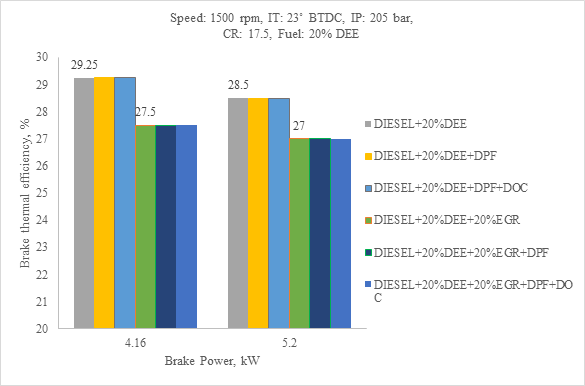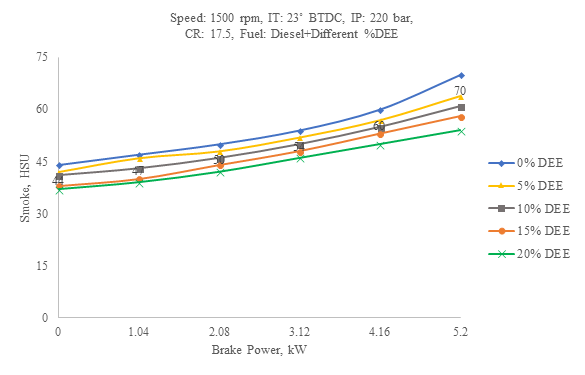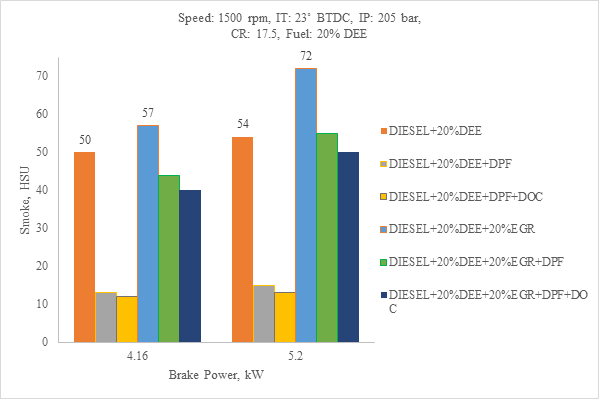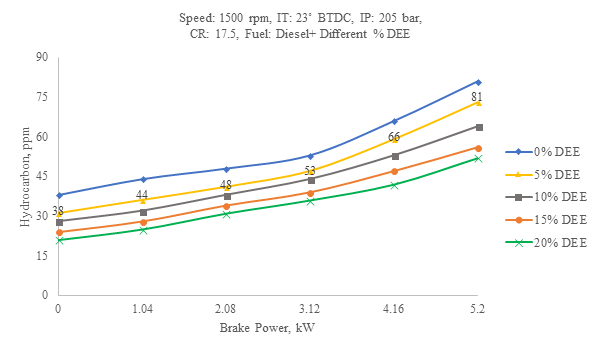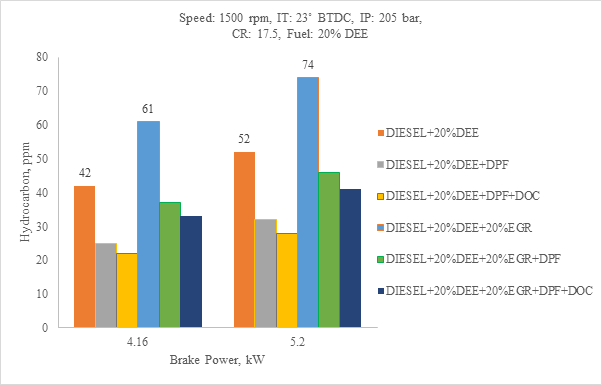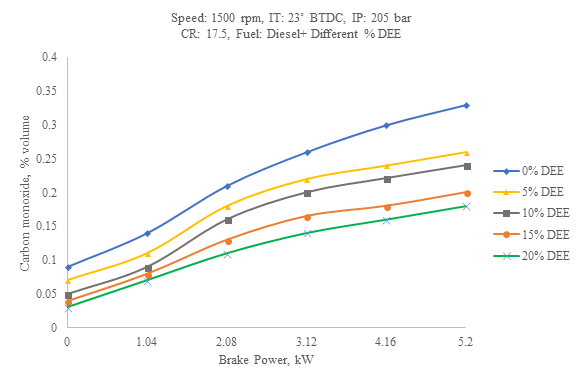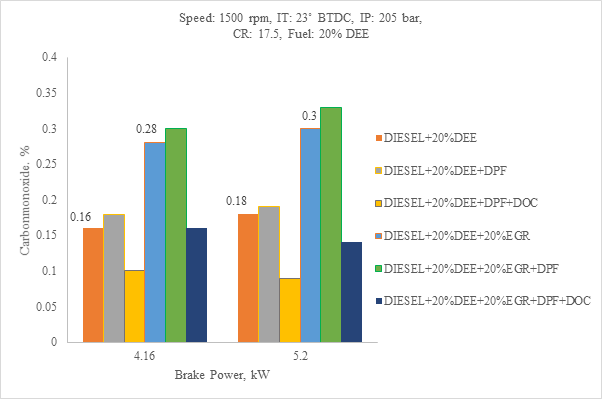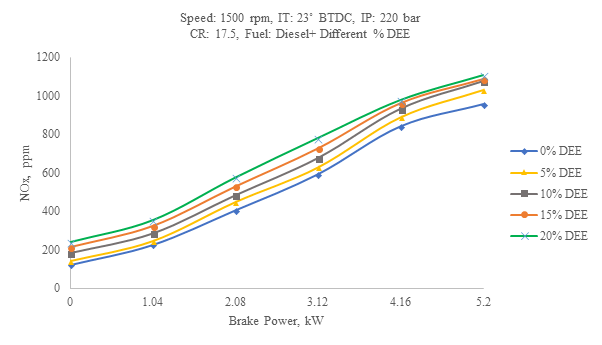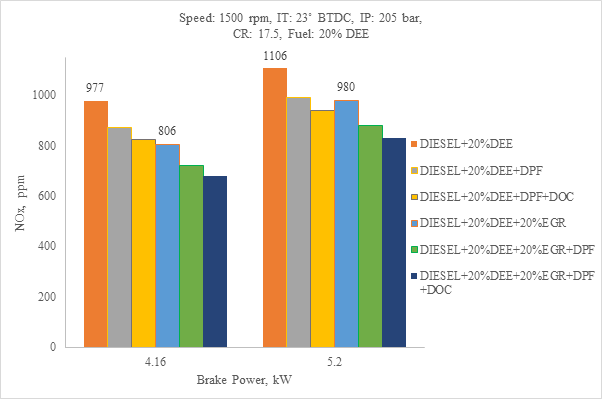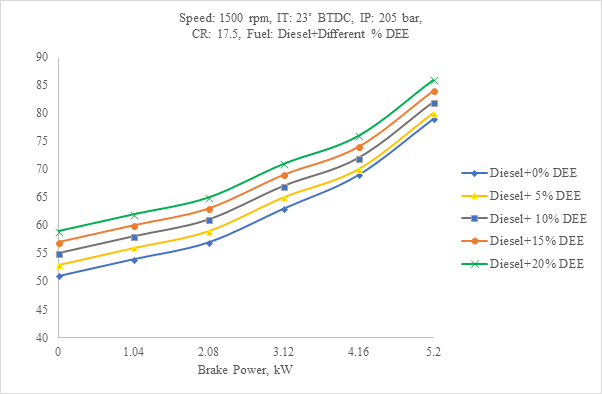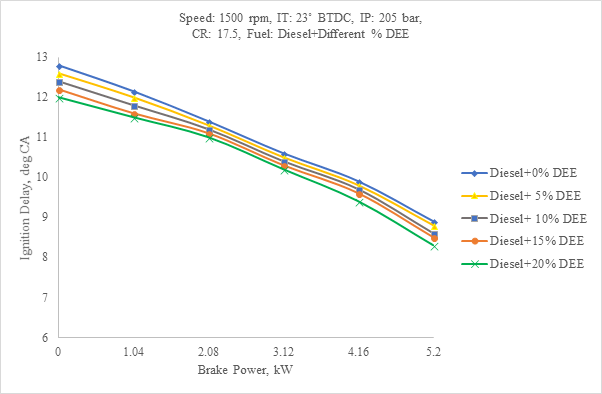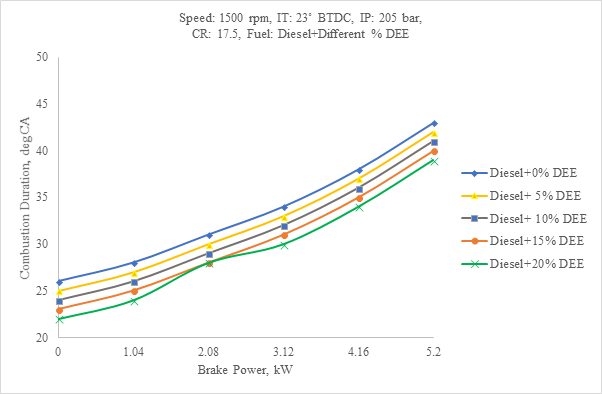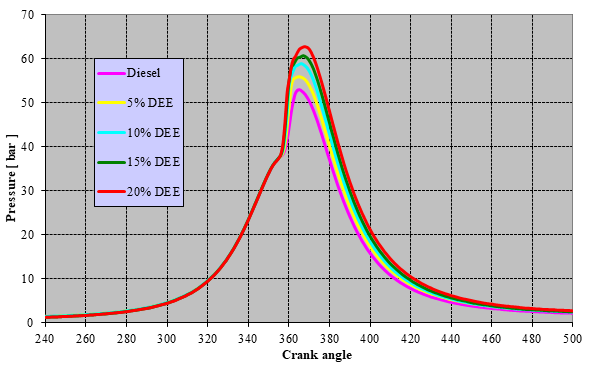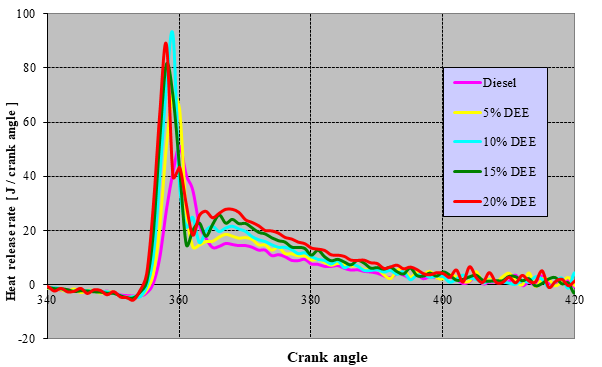INTRODUCTION
Diesel engines are durable, economical and therefore they are an important power source in farming and industrial equipments. However, the problems with them being their higher emissions. Therefore, all researchers should chant the statement “Research makes diesel engine greener”.
Re-circulating the exhaust gas reduced oxides of nitrogen (NOx), but increased smoke emission, hence there is a trade-off between NOx and smoke emission (Agrawal et al., 2004). The experiments were conducted using different injection timing (IT) and exhaust gas recirculation (EGR) to have tradeoff between NOx and smoke (Kouremenos et al., 2001). Potential of blending DEE with diesel fuel in different proportion (5% 10%, 15% and 20%) have been done. Retardation of IT and EGR are yieled reduced the NOx emissions (Mallikarjun et al., 2013). Significant improvements in all emissions with higher thermal efficiency were realized with the oxygenates besides engine noise reduction (Miyamoto et al., 1997). With growing concerns about NOx and particulate matter (PM) emissions from diesel engines, discussed the combination of a diesel particle filter system (DPF) with EGR was used to control of NOx, particulate matter (PM), CO and HC from diesel engines (Chatterjee et al., 2003). After-treatment system developed simultaneously reduced PM and NOx by 80% (Nakatani et al., 2002).
From the review of the literatures, it has been noticed that among the various techniques available to reduce NOx, the EGR is most essential to meet Euro standards.Use of oxygenated fuels like di methyl ether, di ethyl ether are done to enhance the performance. Hence, the present research work is focused on reduction of NOx and smoke emissions in diesel engines also to enhance the brake thermal efficiency (BTE).
The objectives of work are:
-
To conduct experiments on existing diesel engine using DEE as additive blended fuels.
-
To conduct performance test on existing diesel engine having optimized DEE/ Diesel ratio with EGR and study the emission reduction with EGR and after treatment devices.
-
To establish test facilities for conducting experimental investigation of diesel engine with manifold injection for DEE at different timings and duration.
EXPERIMENTAL SET UP AND METHODOLOGY
Experimentations were done on a diesel engine developing 5.2 kW at 1500 rev/min. The specification of diesel engine is as given in the Table 1. The speed of engine was regulated with the help of centrifugal governor. Push rods in engine with hemispherical combustion chamber were used to operate overhead valves. The water circulating through cylinder head and jackets on the engine was used to accomplish the cooling of the engine. The pressure in engine cylinder was measured with cylinder head mounted piezoelectric pressure transducer. The engine had a mechanical fuel injection system. The injector pressure is 205 bar, and static fuel IT is 23˚ BTDC. Figure 1 shows the diesel engine test rig. EGR arrangement shown in Figure 2 was used to control NOx with varied flow rates. DPF and diesel oxidation catalyst (DOC) is placed in the exhaust pipe line of the engine. Figure 3 and Figure 4 shows the photograph of DPF and DOC used in the test runs. The diesel and DEE used in test runs had the property values as shown in Table 2. The HRR was calculated using the procedure followed in literature (Hayes et al., 1986; Hohenberg, 1979).
|
Table 1. Specification of Engine
|
Make and Model
|
Kirloskar, TV1
|
|
Engine type
|
Single cylinder, four stroke, water cooled, direct injection, diesel engine
|
|
Orientation
|
Vertical
|
|
Ignition System
|
Compression Ignition
|
|
Bore X Stroke
|
87.5 mm X 110 mm
|
|
Displacement Volume
|
660 cc
|
|
Compression Ratio
|
17:5:1
|
|
Arrangement of valves
|
Overhead
|
|
Combustion Chamber
|
Open Chamber (Direct Injection)
|
|
Rated Power
|
5.2 kW (7HP) @ 1500 rpm
|
|
Cooling Medium
|
Water cooled
|
|
Air measurement manometer
|
|
|
Made
|
MX 201
|
|
Type
|
U-type
|
|
Range
|
100-0-100 mm
|
|
Eddy current dynamometer
|
|
|
Model
|
AG-10
|
|
Type
|
Eddy current
|
|
Maximum
|
7.5 KW @ 1500-3000 rpm
|
|
Flow
|
Must flow through dynamometer
|
|
Dynamometer arm length
|
0.180 m
|
|
Fuel measuring range
|
0-50 ml
|
|
|
Table 2. Specification of Engine
|
Ratios
|
Diesel
|
5% DEE
|
10% DEE
|
15% DEE
|
20% DEE
|
|
Specific Gravity (gm/cc)
|
0.77
|
0.80
|
0.822
|
0.846
|
0.8806
|
|
Viscocity
|
2.61
|
2.20
|
1.90
|
1.70
|
1.24
|
|
Calorific value (kJ/kg)
|
43000
|
43485
|
43860
|
44640
|
45041
|
|
Preparation of Di Ethyl Ether Blends
The respective blends of DEE with diesel in varied percentage of 5% to 20% in steps of 5% were prepared and for this 1000 ml measuring jar, 10 ml graduated test tube, container and the mechanical stirrer were used to prepare respective blends.
Following method was adopted for the blend preparation.
-
The measuring jar and graduated test tube were thoroughly washed and cleaned dry.
-
Required quantity of diesel was taken in the measuring jar and based on the requirement 50, 100, 150 and 200 ml of DEE was added to it.
-
The mixture in the container was thoroughly stirred for about 10-15 minutes by mechanical stirrer to obtain proper blending.
-
20 ml of ethyl acetate was poured as an additive so as to prevent the interfacial tension between DEE and diesel.
RESULTS AND DISCUSSIONS
This section explains the performance of the diesel engine operated on diesel engine at different load by varying the percentage of DEE as 5%, 10%, 15% and 20% by volume respectively. Also results of experiments conducted on 20% DEE/ diesel blends at two loads respectively at fixed EGR rate of 20%, DPF and DOC were discussed.
erformance Characteristics
Brake Thermal Efficiency
Figure 5 visualizes the variation of efficiency at different loads when the engine is supplied with 0, 5, 10, 15 and 20% volume of DEE. The efficiency has increased with increase in load (up to 80%) for all the volume of DEE. BTE is found to be increasing by injecting the diethyl ether. The reason is that di-ethyl ether which is added as an additive supply as an extra oxygen molecule to the fuel for burning. Higher oxygen content led to better combustion and hence better BTE. Higher cetane number of DEE could also be a reason for better BTE. The highest BTE was found to 29.25% for 80% load condition using 20% DEE and without EGR.
BTE at 80% loads when the engine injected with 20% DEE with 20% EGR, using DPF and DOC is shown in Figure 6 BTE decreased when EGR is introduced. At 80% load, the engine has highest BTE of 29.25% without EGR and with 20% DEE.
Emission Characteristics
Smoke Emissions
The variation of Smoke emissions at different loads when the engine is supplied with 0%, 5%, 10%, 15% and 20% volume of DEE is as shown in Figure 7. Smoke is reduced with increase in blend of DEE. This reduction benefit is due to the presence of oxygen content in the DEE which enables normal combustion. Higher cetane number and lower auto ignition temperature of DEE could also be a reason for lower smoke. Additionally, smoke emissions are inhibited by the high volatility of diethyl ether. At 80% load, the smoke emission was found to be 60 HSU and 50 HSU for 0% and 20% DEE respectively.
Smoke Emissions
Figure 8 shows the effect of EGR, DPF and DOC on Smoke emissions. The engine powered with 20% DEE without EGR had smoke emission of 50 HSU and it reduced to 13 HSU with DPF and further to 12 HSU with DOC. i.e, reduction in smoke emission by DPF was about 75% and by DOC by 7%.
HC Emissions
The variation of HC emissions at different loads when the engine is supplied with 0%, 5%, 10%, 15% and 20% DEE is as shown in Figure 9. The HC emissions of the engine is decreased with increase in DEE ratio due to the oxygenated additives blends provided better and normal combustion. At 80% load, the HC emission was found to be 66 ppm and 42 ppm for 0% and 20% DEE respectively. The variation of HC emission of diesel engine using DPF and DOC is shown in Figure 10. The HC emissions of the engine increased with EGR for both the loads. At 80% load, with 20% EGR, HC reduced by 40% adopting DPF and by 10% adopting DOC respectively.
CO Emissions
The variation of CO emissions at different loads when the engine is supplied with 0%, 5%, 10%, 15% and 20% DEE is as shown in Figure 11. The CO emission has decreased with increase in DEE blends. This reduction benefit is due to the presence of oxygen content in the DEE which enables better combustion and formation of CO is less. Higher cetane number also could be the reason for lower CO. At 80% load, the CO emission was found to be 0.3% volume and 0.16% volume for 0% and 20% DEE respectively.
CO emissions for two loads when the engine is powered with 20% DEE, 20% EGR, DPF and DOC respectively as shown in Figure 12. CO emission increased when using DPF by 8% by volume. However, CO emission decreased with DOC further by 45% by volume. Hence, utilizing only DPF is not advisable and combination of both DPF & DOC is essential for such engine operation.
NOx Emissions
The variation of NOx emissions at different loads when the engine is supplied with 0%, 5%, 10%, 15% and 20% DEE is as shown in Figure 13. The NOx emission has increased by injecting DEE. The formation of NOx is primarily a function of flame temperature, the residence time at that temperature, and the availability of oxygen in combustion chamber. More oxygen content in the DEE and higher cetane number, enhances the combustion process leading to increased combustion temperature there by increase in NOx emission. At 80% load, the NOx emission was found to be 840 ppm and 977 ppm for 0% and 20% DEE respectively.
Variation of NOx emissions for two loads when the engine provided with 20% DEE, DPF and DOC respectively as shown in Figure 14. NOx emission reduced by both DPF and DOC combinations. With DEE injection, NOx emissions have increased, hence EGR was essential to further reduce it. It is observed that, adopting DPF, NOx emission reduced by 10%; adopting DOC, NOx emission further reduced by 6%. Similar reduction percentage by DPF and DOC was observed when the engine was fuelled with neat diesel.
Combustion Characteristics
In this section, different combustion parameters at load conditions are presented in the form of graphs. The results are analyzed, discussed and compared with diesel fuel operation.
Peak Pressure
Figure 15 shows the variation of peak pressure with brake power for 0%, 5%, 10%, 15% and 20% DEE. The peak pressure has increased with increase in load for all DEE blends. The peak pressure is found to be highest for 20% DEE blend. This increase in cylinder pressure results in higher power output. This could be on account of faster combustion due to more oxygen present and higher cetane number of DEE. The highest peak pressure is found to be 76 bar for 20%DEE operation at 80% load.
Ignition Delay
Figure 16 shows the variation of ignition delay with Brake power for 0%, 5%, 10%, 15% and 20% DEE. Based on heat release rate graph, the ignition delay has decreased with addition of DEE. According to the in-cylinder pressure and heat release profiles, combustion starts with lesser delay for all of diethyl ether blends with baseline fuel and it becomes lesser prominent with higher diethyl ether blends. With increase in load, air-fuel ratio decreases, operating temperature increases and hence, delay period decreases.
At 80% load, the delay period observed as 9.9 deg CA and 9.4 deg CA for neat diesel and Diesel + 20% DEE respectively.
Combustion Duration
Figure 17 shows the variation of combustion duration with brake power for different DEE blends. The duration of combustion has decreased with increase in DEE blends. The reason could be faster combustion due to higher cetane number. At 80% load, the combustion duration is 38 deg CA and 34 deg CA for neat diesel and Diesel + 20% DEE condition. The combustion duration observed with DEE was significantly shorter than that of diesel. This could be due to lower auto ignition temperature and higher cetane number of DEE.
Cylinder Pressure
The cylinder pressure – crank angle history was acquired for 100 cycles and the averaged pressure variation with crank angle at 80% load when diesel injected at 0%, 5%, 10%, 15%, 20% DEE blended with diesel is shown in Figure 18. The mixture formation during delay period and extent of ignition delay period regulates uncontrolled combustion phase. This mixture preparation during the ignition delay period is responsible for the variations of peak pressure and maximum rate of pressure rise.
According to in-cylinder pressure and heat release profiles, combustion starts with delay for all of diethyl ether blends with baseline diesel fuel and it becomes more prominent with higher diethyl ether blends.
Heat Release Rate
Figure 19 shows the variation of heat release rate for diesel injected with 0%, 5%, 10%, 15%, 20% DEE blended with diesel respectively.
The performance and emission values at these conditions are mentioned in Table 3.
|
Table 3. The performance and emission values at optimum conditions
|
Load
|
80% Full load
|
|
Brake Power
|
4.16 kW
|
|
Brake thermal efficiency
|
27.5%
|
|
Peak pressure
|
69 bar
|
|
Ignition delay
|
10.2 deg CA
|
|
Combustion duration
|
44 deg CA
|
|
Smoke emissions
|
11 HSU
|
|
Hydrocarbon emissions (HC)
|
33 ppm
|
|
Carbon monoxide emissions (CO)
|
0.16%
|
|
Nitrogen oxide (NOx)
|
680 ppm
|
|
CONCLUSIONS
The single cylinder diesel engine was operated on diesel with diethyl ether in blended form with and without EGR and having DPF & DOC. It is observed that the engine was consistent in its operation throughout the experimental investigations when operated on selected fuel combination.
Based on the comprehensive experimental investigations carried out the following conclusions have been derived.
-
BTE is found to be increasing by injecting the diethyl ether. The reason is that di-ethyl ether which is added as an additive supply as an extra oxygen molecule to the fuel for burning.
-
The highest BTE was found to 29.25% for 80% load condition using 20% DEE and without exhaust gas recirculation.
-
The HC emissions of the engine is increased with increase in DEE ratio due to the oxygenated additives blends provided better and normal combustion.
-
At 80% load, the CO emission was found to be 0.3% and 0.16% for 0% and 20% DEE respectively.
-
Since more oxygen content in the DEE, there is increase in NOx emmission. At 80% load, the NOx emission was found to be 840 ppm and 977 ppm for 0% and 20% DEE respectively.
-
The peak pressure has increased with increase in load for all DEE blends.
-
According to the in-cylinder pressure and heat release profiles, combustion starts with lesser delay for all of diethyl ether blends with baseline fuel and it becomes lesser prominent with higher diethyl ether blends.
-
The combustion duration observed with DEE was significantly shorter than that of diesel. This could be due to lower auto ignition temperature and higher cetane number of DEE.
-
The efficiency reduced when exhaust gas is introduced into the intake. This happens due to burnt gas occupying the engine cylinder which thereby reduces the availability of oxygen for combustion.
-
At 80% load, 20% DEE blend and 20% EGR, the efficiency obtained is 27.5%.
-
The increase in smoke was observed with increase in EGR for all operating conditions. The HC value of 61 ppm were obtained when the diesel engine is injected with 20% DEE and having 20% EGR at 80% load
-
The CO emission has decreased with increase in DEE/ diesel blends. It’s a indication that the combustion in better with the addition of DEE.
-
The NOx emission has decreased with increase in EGR rates. This reduction is predominant when the diesel engine is operating with 20% DEE ratio.
-
For the engine having 20% DEE fuel, smoke emissions reduced by at least 75% by having DPF. Having DPF, HC emission reduced from 42 ppm to 26 ppm. With DOC, emission reduced from 26 ppm to 22 ppm.
-
The CO emission has increased with using DPF by 15%. However, CO emission decreased with DOC oxidises by 45%.
-
It is observed that, adopting DPF, NOx emission reduced by 10%; adopting DOC, NOx emission reduced by 6%.
Overall the optimum engine operating condition is found to be DEE of 20% with 20% EGR when both DPF and DOC were adopted.
ACKNOWLEDGEMENTS
The authors would like to thank the Research Centre, Department of Mechanical Engineering, Acharya Institute of Technology, Bangalore for their continuous help.

 Full Text (PDF)
Full Text (PDF)





